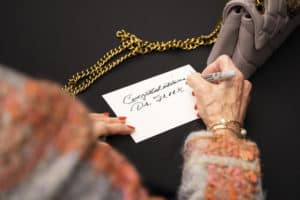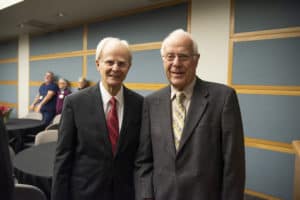A standing-room-only crowd gathered Dec. 17, including members of the Harvey & Bernice Jones Eye Institute Advisory Board, to celebrate John Shock, M.D., and the 40 years he has given in service to UAMS.
Faculty, staff, patients and others gathered to share memories of Shock’s many years of service and many accomplishments as former chair of the Department of Ophthalmology in the College of Medicine and founding director of the Jones Eye Institute.
“Those of us who work here at JEI owe this lovely workplace and many of the opportunities we have to Dr. Shock’s leadership,” said Christopher T. Westfall, M.D., executive vice chancellor and dean of the UAMS College of Medicine. I think that many of us, particularly those of us who are newer, don’t realize how much we owe to Dr. Shock.”
Shock arrived at UAMS in 1979 to lead the ophthalmology department. At the time, Gissur Petursson, M.D., who had been acting as interim chair, was the only other faculty member.
“The eye institute began in the basement of the outpatient clinic,” Westfall continued. “Now we have a nine-story building, which has some of the best equipment in the world, is staffed by some of the finest people in the world, and has a faculty who are committed to education, research and patient care.”
As part of the celebration, Sami Uwaydat, M.D., interim chair of the department presented Shock with a gift marking his 40 years and also thanked Shocks’ wife, Nancy, who has been by his side the whole time.
“We all know the immense work that Dr. Shock has done. This institution would not have been possible and none of us would be here without Dr. Shock’s 40 years of selfless dedication to resident education and patient care,” said Uwaydat. “I still see patients that Dr. Shock took care of 40 years ago, and that should give you some idea of the tremendous work that he has done for so many Arkansans.”
Shock thanked the many contributors to Jones Eye Institute over the years, including those who have long served on its advisory board.
“Many of you have been on the board for, well, 40 years,” he laughed. “It’s always great to have people on the board stay on the board to provide the input they do.”
Shock told how it was an original board member, Morriss Henry, M.D., J.D., who introduced him to Bernice Jones, who provided a $1 million gift to fund research early in his tenure and ultimately would give $5.5 million to lead the way in establishing the Jones Eye Institute. That gift would be complemented by $15 million from Pat Walker, for whom Walker Tower is named.
“During my 40 years here, I had the privilege to develop relationships with many philanthropic Arkansans with whom I shared a vision to help build the Jones Eye Institute. That became possible when Bernice Jones provided the lead gift for the first four floors plus parking underneath and Pat Walker later added resources for the second five floors. Of course, there were many others who provided significant financial contributions,” Shock said.

Shock credited the leadership of former chancellor Harry Ward, M.D., who arrived on campus the same month he did, for providing the opportunity and the encouragement to build a culture of philanthropy at UAMS and for the vision of the expansive campus that exists today.
Shock reminded those gathered of his trust-based philosophy when it comes to giving, which has guided so much of the work he accomplished as institute director and, after he stepped down, as an unpaid director of development for the institution.
“The development worker must listen carefully. Do not assume you already know what the donor wants to do based on their past gifts. By listening carefully, you are given an opportunity to suggest areas that are important to the donor and for which they can take great pride,” he said. “You serve donors when you help them invest their money into something in which they have an emotional stake.
“The key is knowing that, from the donor’s perspective, a major gift is not defined by any criteria of the organization but by the significance placed on that gift by the donor. The truth is, it’s about providing donors the opportunity to experience joy they can experience in no other way.”


